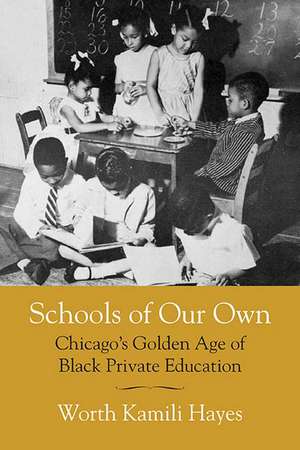Schools of Our Own: Chicago's Golden Age of Black Private Education
Autor Worth Kamili Hayesen Limba Engleză Paperback – 14 dec 2019
Winner, 2020 American Educational Studies Association Critics' Choice Award
As battles over school desegregation helped define a generation of civil rights activism in the United States, a less heralded yet equally important movement emerged in Chicago. Following World War II, an unprecedented number of African Americans looked beyond the issue of racial integration by creating their own schools. This golden age of private education gave African Americans unparalleled autonomy to avoid discriminatory public schools and to teach their children in the best ways they saw fit. In Schools of Our Own, Worth Kamili Hayes recounts how a diverse contingent of educators, nuns, and political activists embraced institution building as the most effective means to attain quality education. Schools of Our Own makes a fascinating addition to scholarly debates about education, segregation, African American history, and Chicago, still relevant in contemporary discussions about the fate of American public schooling.
As battles over school desegregation helped define a generation of civil rights activism in the United States, a less heralded yet equally important movement emerged in Chicago. Following World War II, an unprecedented number of African Americans looked beyond the issue of racial integration by creating their own schools. This golden age of private education gave African Americans unparalleled autonomy to avoid discriminatory public schools and to teach their children in the best ways they saw fit. In Schools of Our Own, Worth Kamili Hayes recounts how a diverse contingent of educators, nuns, and political activists embraced institution building as the most effective means to attain quality education. Schools of Our Own makes a fascinating addition to scholarly debates about education, segregation, African American history, and Chicago, still relevant in contemporary discussions about the fate of American public schooling.
Preț: 209.33 lei
Nou
Puncte Express: 314
Preț estimativ în valută:
40.06€ • 41.32$ • 33.43£
40.06€ • 41.32$ • 33.43£
Carte disponibilă
Livrare economică 05-19 martie
Livrare express 19-25 februarie pentru 26.18 lei
Preluare comenzi: 021 569.72.76
Specificații
ISBN-13: 9780810141186
ISBN-10: 0810141183
Pagini: 176
Ilustrații: 11 b-w images
Dimensiuni: 152 x 229 x 15 mm
Greutate: 0.25 kg
Editura: Northwestern University Press
Colecția Northwestern University Press
ISBN-10: 0810141183
Pagini: 176
Ilustrații: 11 b-w images
Dimensiuni: 152 x 229 x 15 mm
Greutate: 0.25 kg
Editura: Northwestern University Press
Colecția Northwestern University Press
Notă biografică
WORTH KAMILI HAYES is an associate professor of history at Tuskegee University. He was previously the acting chair of the Department of Social Sciences and Criminal Justice at Benedict College. His work centers on African American education, urban history, and the black freedom struggle in the twentieth century.
Cuprins
Acknowledgements
Abbreviations
Introduction
“What He Needs is Education”: Black Education in Chicago to 1940
“For the Very Meaning of Our Lives”: Howalton Day School: 1946-1986
“Something Far More Ennobling”: Holy Name of Mary, 1940-2002
“We Have Done Black Things Today and We’re Going to Do Black Things Again Tomorrow”: New Concept Development Center, 1972-1998
Epilogue: "We Have to Invest in Our Own Power"
Notes
Bibliography
Abbreviations
Introduction
“What He Needs is Education”: Black Education in Chicago to 1940
“For the Very Meaning of Our Lives”: Howalton Day School: 1946-1986
“Something Far More Ennobling”: Holy Name of Mary, 1940-2002
“We Have Done Black Things Today and We’re Going to Do Black Things Again Tomorrow”: New Concept Development Center, 1972-1998
Epilogue: "We Have to Invest in Our Own Power"
Notes
Bibliography
Descriere
This book uncovers the forgotten history of private schools built and run by African Americans throughout the civil rights struggle for school desegregation.
